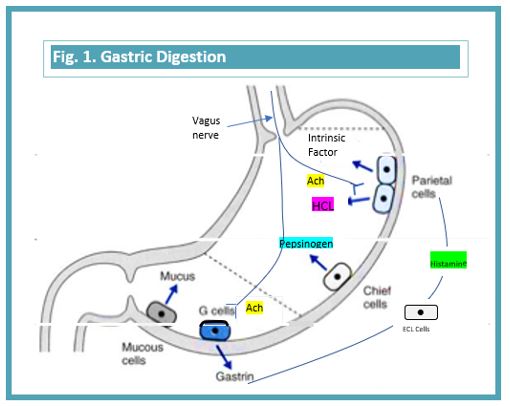Hydrochloric Acid – Why it’s Essential for Optimal Digestion
InterClinical eNews December 2018, Issue 87
The festive season is upon us, bringing matters of digestion into focus. In this issue, we go back to the basics, exploring the physiology and biochemistry of gastric acid production. In particular, we look at the importance of acidification and the role of nutrients and metabolites in hydrochloric acid production.
The Importance of Acidification
The acidification of the stomach contents yields several digestive benefits. Firstly, it denatures proteinaceous foods making them easier to digest. Secondly, it assists protein digestion by converting pepsinogen to pepsin – a powerful proteolytic enzyme which sterilises the upper gastrointestinal tract. Thirdly, it renders the gastric environment unsuitable for most pathogens.
In the small intestine, acidification helps prevents bacterial and fungal overgrowth, supports the flow of pancreatic enzymes and bile release, and facilitates the absorption of a range of nutrients. These include vitamin B12, folate, ascorbic acid, beta-carotene, non-haem iron, as well as some calcium, magnesium, and zinc compounds. (1)
Hypochlorhydria
If undetected for extended periods, persistent low stomach acid (hypochlorhydria) may cause a wide range of symptoms with long-term health implications. Common symptoms include:

Control of Acid Production
The Gastric proton pump, the H+– K+ ATPases, is responsible for acidifying the stomach juice down to a pH as low as one. When inactive, the number of H+– K+ ATPases present within the parietal cell membrane is minimal. The remainder is stored within the parietal cell vesicles. However, when activated, these vesicles merge with the parietal cell membrane, precipitating increased infusion of H+– K+ATPase into the membrane. This facilitates the increased movement of hydrogen ions into the stomach, thereby increasing acid production. (2)
Protagonists of Hydrochloric Acid Production

Acetylcholine
There are three ways in which acid production can be increased. The first of these is indirect via acetylcholine; a neuropeptide released from the vagus nerve. Its secretion is activated by the sight of, or during the chewing of food, which in turn directly stimulates the parietal cells via the vagus nerve. Acetylcholine is also produced when the stomach becomes distended during digestion, triggering vagal stimulation of the intrinsic nerves.
Gastrin
The principal regulatory pathway involves the hormone gastrin which is secreted from G cells in the stomach. G cells are activated by the vagus nerve, gastrin related peptide and by peptides in the stomach lumen produced via protein digestion. Activation of the G cells leads to the production of gastrin which is released into the blood through which it travels until it reaches the parietal cells. Gastrin then binds to cholecystokinin (CCK) receptors on the parietal cells, elevating calcium and causing increased vesicular fusion.
Histamine
Next, enterochromaffin-like stomach cells produce histamine which binds to H2 receptors on the stomach’s parietal cells. These cells only release histamine in response to the presence of both gastrin and acetylcholine. This leads to increased vesicular fusion via the secondary messenger cAMP. Nicotinamide has been shown to be effective in raising histamine levels in healthy males. (2)
Role of Potassium
Potassium plays an essential role in the gastric H+– K+ ATPase cascade which ultimately leads to hydrochloric acid secretion from the parietal cell ducts. This cation is not only the counterpoint for H+ that allows the formation of an extremely acidic environment in the parietal cell ducts, but it is also an essential ion for the functioning of the enzyme itself. (3)
INTERCLINICAL COMMENT
Where stomach acid is found to be low, the pH of the stomach contents rises well above the optimal pH of 2. Protein digestion begins to suffer, and the upper GI tract becomes more susceptible to harbouring unwanted bugs. This can lead to gastritis, protein deficiency, and persistent deficiencies of several essential vitamins and minerals, such as iron and vitamin B12. Susceptible populations include the elderly and those with gastrointestinal issues or who have undergone bariatric surgery. As a practitioner, it is important to identify these symptoms.
REFERENCES
- Thompson
A. Question from practice: Management of hypochlorhydria. Lung cancer.
2018 Jun 12;15:05. - Tian
YJ, Li D, Ma Q, Gu XY, Guo M, Lun YZ, Sun WP, Wang XY, Cao Y, Zhou SS.
Excess nicotinamide increases plasma serotonin and histamine levels. Acta
Physiologica Sinica. 2013;65(1):33-8. - Geibel JP. Role of potassium in acid secretion. World
journal of gastroenterology. 2005;11(34):5259.
Copyright InterClinical Laboratories 2018, 2020

No Comments
Sorry, the comment form is closed at this time.